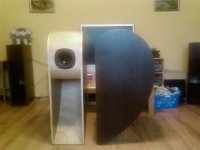Hey freddi, that is great info!
Tyimo, I'm a newbie but here's what I've learned from the Replikon people from their thread here and at their site, www.hornlautsprecher.de - solutions in sound
Whereas a traditional BLH uses a low Qts driver, a small chamber and a long path, a Replikon-style BVR will use a higher Qts driver (if possible), a larger chamber, and a path that is shorter than a BLH (not longer than 1.4 meters, possibly quite a bit shorter).
1. Determine chamber size. The volume will be pretty much what a bass reflex would use. According to the Replikon "resonance theory," you further refine the volume via trial and error. Build a box and then using wooden blocks to reduce chamber volume until the box "disappears" and the human voice sounds correct, and seems to "separate itself" from the driver. (Use the amp that you'll ultimately have in your system, and ideally, you'd do this in the intended room as well.)
2. Then use the modeling software to determine the type of horn-shaped vent that will give you ~flat response. For a throat, start out modeling with .5 to .8 of the driver's piston area (Sd). Regarding the horn size, you may end up gradually reducing the horn size in order to get a flat response.
3. Don't forget to take baffle step into account. In my mind, this is the hardest part. AJ-Horn does not model baffle step (if you end up using that tool), so you have to calculate and then build in a bit of a rise in the response. MJK will model baffle step obviously.
4. Unrelated to the Replikon guys, but on the same topic, Onur adds two ideas. First, he says (using a Coral) that listeners like a bit of a bass boost (rather than a flat response). Also, he says the driver and horn mouth should be offset (the horn mouth should be closer to the listener) because it improved the sound. I have not had a chance to try these two suggestions yet.
Tyimo, I'm a newbie but here's what I've learned from the Replikon people from their thread here and at their site, www.hornlautsprecher.de - solutions in sound
Whereas a traditional BLH uses a low Qts driver, a small chamber and a long path, a Replikon-style BVR will use a higher Qts driver (if possible), a larger chamber, and a path that is shorter than a BLH (not longer than 1.4 meters, possibly quite a bit shorter).
1. Determine chamber size. The volume will be pretty much what a bass reflex would use. According to the Replikon "resonance theory," you further refine the volume via trial and error. Build a box and then using wooden blocks to reduce chamber volume until the box "disappears" and the human voice sounds correct, and seems to "separate itself" from the driver. (Use the amp that you'll ultimately have in your system, and ideally, you'd do this in the intended room as well.)
2. Then use the modeling software to determine the type of horn-shaped vent that will give you ~flat response. For a throat, start out modeling with .5 to .8 of the driver's piston area (Sd). Regarding the horn size, you may end up gradually reducing the horn size in order to get a flat response.
3. Don't forget to take baffle step into account. In my mind, this is the hardest part. AJ-Horn does not model baffle step (if you end up using that tool), so you have to calculate and then build in a bit of a rise in the response. MJK will model baffle step obviously.
4. Unrelated to the Replikon guys, but on the same topic, Onur adds two ideas. First, he says (using a Coral) that listeners like a bit of a bass boost (rather than a flat response). Also, he says the driver and horn mouth should be offset (the horn mouth should be closer to the listener) because it improved the sound. I have not had a chance to try these two suggestions yet.
Code:
My apologiesThe driver is a bit modificated 8" Tannoy DC. So it is not a fullrange but a 2way speaker!
Tyimo
I understand How the Replikon works....😉
There you go 🙂
Replikon is a BVR so you have known all along.
dave
- Status
- Not open for further replies.
